Julia Kiseleva
IDAT: A Multi-Modal Dataset and Toolkit for Building and Evaluating Interactive Task-Solving Agents
Jul 12, 2024



Abstract:Seamless interaction between AI agents and humans using natural language remains a key goal in AI research. This paper addresses the challenges of developing interactive agents capable of understanding and executing grounded natural language instructions through the IGLU competition at NeurIPS. Despite advancements, challenges such as a scarcity of appropriate datasets and the need for effective evaluation platforms persist. We introduce a scalable data collection tool for gathering interactive grounded language instructions within a Minecraft-like environment, resulting in a Multi-Modal dataset with around 9,000 utterances and over 1,000 clarification questions. Additionally, we present a Human-in-the-Loop interactive evaluation platform for qualitative analysis and comparison of agent performance through multi-turn communication with human annotators. We offer to the community these assets referred to as IDAT (IGLU Dataset And Toolkit) which aim to advance the development of intelligent, interactive AI agents and provide essential resources for further research.
Assessing and Verifying Task Utility in LLM-Powered Applications
May 03, 2024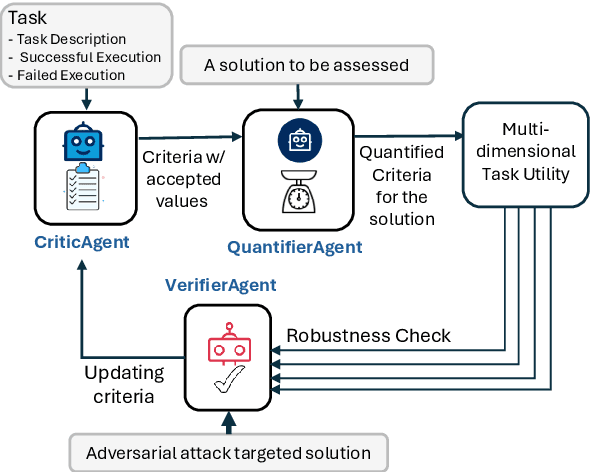

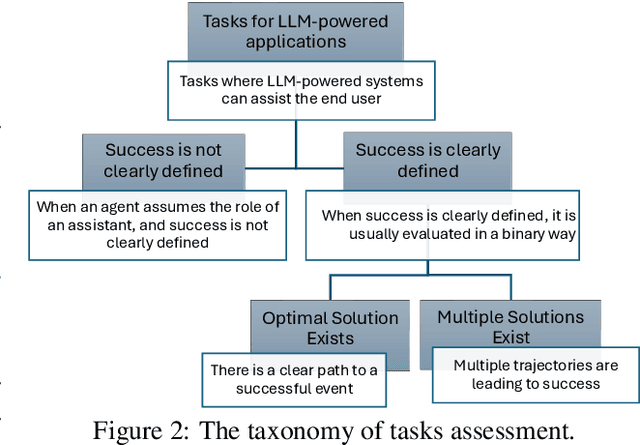
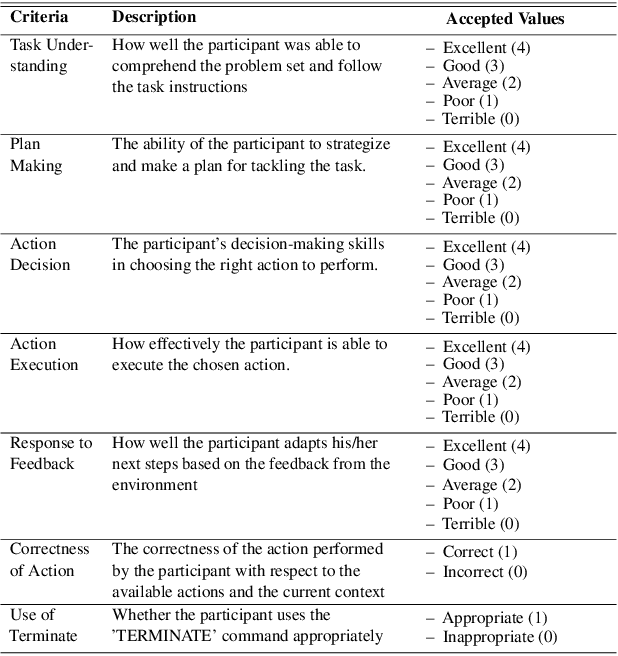
Abstract:The rapid development of Large Language Models (LLMs) has led to a surge in applications that facilitate collaboration among multiple agents, assisting humans in their daily tasks. However, a significant gap remains in assessing to what extent LLM-powered applications genuinely enhance user experience and task execution efficiency. This highlights the need to verify utility of LLM-powered applications, particularly by ensuring alignment between the application's functionality and end-user needs. We introduce AgentEval, a novel framework designed to simplify the utility verification process by automatically proposing a set of criteria tailored to the unique purpose of any given application. This allows for a comprehensive assessment, quantifying the utility of an application against the suggested criteria. We present a comprehensive analysis of the effectiveness and robustness of AgentEval for two open source datasets including Math Problem solving and ALFWorld House-hold related tasks. For reproducibility purposes, we make the data, code and all the logs publicly available at https://bit.ly/3w3yKcS .
Towards better Human-Agent Alignment: Assessing Task Utility in LLM-Powered Applications
Feb 22, 2024Abstract:The rapid development in the field of Large Language Models (LLMs) has led to a surge in applications that facilitate collaboration among multiple agents to assist humans in their daily tasks. However, a significant gap remains in assessing whether LLM-powered applications genuinely enhance user experience and task execution efficiency. This highlights the pressing need for methods to verify utility of LLM-powered applications, particularly by ensuring alignment between the application's functionality and end-user needs. We introduce AgentEval provides an implementation for the math problems, a novel framework designed to simplify the utility verification process by automatically proposing a set of criteria tailored to the unique purpose of any given application. This allows for a comprehensive assessment, quantifying the utility of an application against the suggested criteria. We present a comprehensive analysis of the robustness of quantifier's work.
Transforming Human-Centered AI Collaboration: Redefining Embodied Agents Capabilities through Interactive Grounded Language Instructions
May 18, 2023



Abstract:Human intelligence's adaptability is remarkable, allowing us to adjust to new tasks and multi-modal environments swiftly. This skill is evident from a young age as we acquire new abilities and solve problems by imitating others or following natural language instructions. The research community is actively pursuing the development of interactive "embodied agents" that can engage in natural conversations with humans and assist them with real-world tasks. These agents must possess the ability to promptly request feedback in case communication breaks down or instructions are unclear. Additionally, they must demonstrate proficiency in learning new vocabulary specific to a given domain. In this paper, we made the following contributions: (1) a crowd-sourcing tool for collecting grounded language instructions; (2) the largest dataset of grounded language instructions; and (3) several state-of-the-art baselines. These contributions are suitable as a foundation for further research.
Improving Grounded Language Understanding in a Collaborative Environment by Interacting with Agents Through Help Feedback
Apr 21, 2023



Abstract:Many approaches to Natural Language Processing (NLP) tasks often treat them as single-step problems, where an agent receives an instruction, executes it, and is evaluated based on the final outcome. However, human language is inherently interactive, as evidenced by the back-and-forth nature of human conversations. In light of this, we posit that human-AI collaboration should also be interactive, with humans monitoring the work of AI agents and providing feedback that the agent can understand and utilize. Further, the AI agent should be able to detect when it needs additional information and proactively ask for help. Enabling this scenario would lead to more natural, efficient, and engaging human-AI collaborations. In this work, we explore these directions using the challenging task defined by the IGLU competition, an interactive grounded language understanding task in a MineCraft-like world. We explore multiple types of help players can give to the AI to guide it and analyze the impact of this help in AI behavior, resulting in performance improvements.
Collecting Interactive Multi-modal Datasets for Grounded Language Understanding
Nov 18, 2022


Abstract:Human intelligence can remarkably adapt quickly to new tasks and environments. Starting from a very young age, humans acquire new skills and learn how to solve new tasks either by imitating the behavior of others or by following provided natural language instructions. To facilitate research which can enable similar capabilities in machines, we made the following contributions (1) formalized the collaborative embodied agent using natural language task; (2) developed a tool for extensive and scalable data collection; and (3) collected the first dataset for interactive grounded language understanding.
Learning to Solve Voxel Building Embodied Tasks from Pixels and Natural Language Instructions
Nov 01, 2022Abstract:The adoption of pre-trained language models to generate action plans for embodied agents is a promising research strategy. However, execution of instructions in real or simulated environments requires verification of the feasibility of actions as well as their relevance to the completion of a goal. We propose a new method that combines a language model and reinforcement learning for the task of building objects in a Minecraft-like environment according to the natural language instructions. Our method first generates a set of consistently achievable sub-goals from the instructions and then completes associated sub-tasks with a pre-trained RL policy. The proposed method formed the RL baseline at the IGLU 2022 competition.
IGLU Gridworld: Simple and Fast Environment for Embodied Dialog Agents
May 31, 2022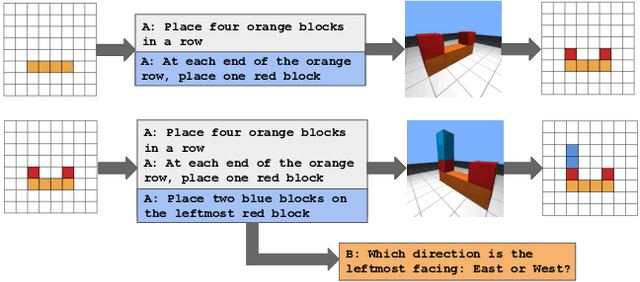


Abstract:We present the IGLU Gridworld: a reinforcement learning environment for building and evaluating language conditioned embodied agents in a scalable way. The environment features visual agent embodiment, interactive learning through collaboration, language conditioned RL, and combinatorically hard task (3d blocks building) space.
IGLU 2022: Interactive Grounded Language Understanding in a Collaborative Environment at NeurIPS 2022
May 27, 2022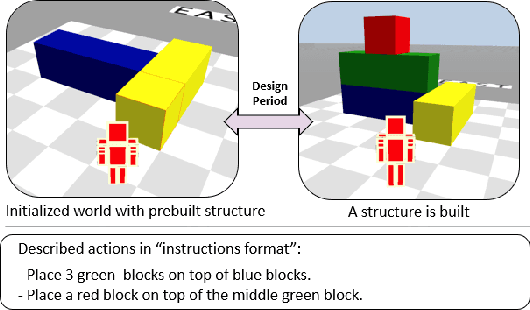

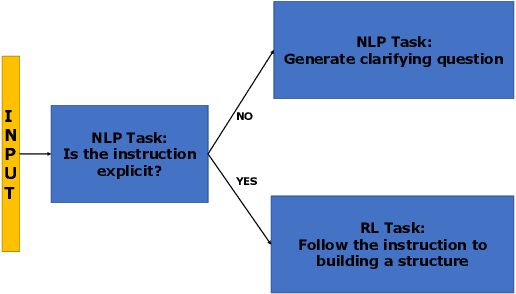
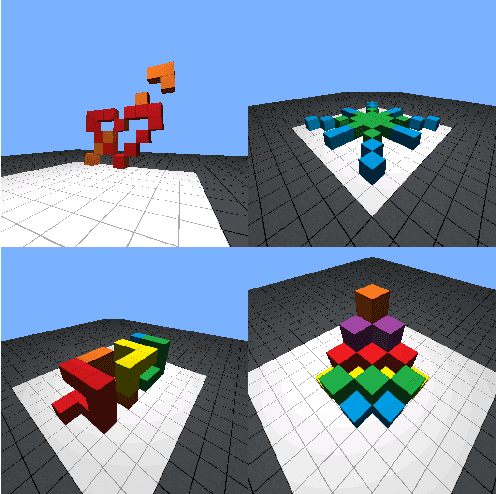
Abstract:Human intelligence has the remarkable ability to adapt to new tasks and environments quickly. Starting from a very young age, humans acquire new skills and learn how to solve new tasks either by imitating the behavior of others or by following provided natural language instructions. To facilitate research in this direction, we propose IGLU: Interactive Grounded Language Understanding in a Collaborative Environment. The primary goal of the competition is to approach the problem of how to develop interactive embodied agents that learn to solve a task while provided with grounded natural language instructions in a collaborative environment. Understanding the complexity of the challenge, we split it into sub-tasks to make it feasible for participants. This research challenge is naturally related, but not limited, to two fields of study that are highly relevant to the NeurIPS community: Natural Language Understanding and Generation (NLU/G) and Reinforcement Learning (RL). Therefore, the suggested challenge can bring two communities together to approach one of the crucial challenges in AI. Another critical aspect of the challenge is the dedication to perform a human-in-the-loop evaluation as a final evaluation for the agents developed by contestants.
Interactive Grounded Language Understanding in a Collaborative Environment: IGLU 2021
May 05, 2022
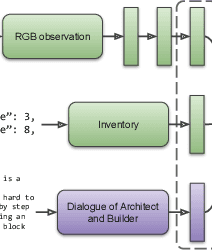

Abstract:Human intelligence has the remarkable ability to quickly adapt to new tasks and environments. Starting from a very young age, humans acquire new skills and learn how to solve new tasks either by imitating the behavior of others or by following provided natural language instructions. To facilitate research in this direction, we propose \emph{IGLU: Interactive Grounded Language Understanding in a Collaborative Environment}. The primary goal of the competition is to approach the problem of how to build interactive agents that learn to solve a task while provided with grounded natural language instructions in a collaborative environment. Understanding the complexity of the challenge, we split it into sub-tasks to make it feasible for participants.
* arXiv admin note: substantial text overlap with arXiv:2110.06536
 Add to Chrome
Add to Chrome Add to Firefox
Add to Firefox Add to Edge
Add to Edge